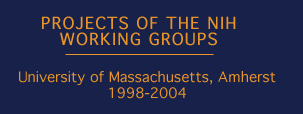|
|

The Working Groups are organized into study sections, each devoted to one of the traditional areas of language description: syntax, semantics, phonology, and pragmatics, as outlined under “People.” Each subgroup meets regularly by itself with a general meeting bi-monthly. General meetings often include an invited presentation and are open to the university community. For more information about meetings, contact the Project Manager, Barbara Pearson. The contract also includes an unusual collaboration between academia and the business world. The UMass group subcontracted with The Psychological Corporation (TPC) of San Antonio TX, one of the largest test publishers in the country. TPC is contributing resources to the development process and will publish the test at the end of the NIH contract.
Ongoing research on AAE, begun in the development of a Dialect Sensitive Language Screener by the Principal Investigators, Seymour, Roeper, and de Villiers with an NIH grant from 1993 to 1997, continues to be a major objective of the Working Groups. Dissertations to date have provided crucial new insights about copula production, negative concord, verbal aspect in AAE, the phonology of final consonant perception, and the semantics of verbal suffixes in a fast-mapping paradigm. Current research includes Ph.D. dissertations on the development of narrative skills and of definite reference in the early school years. Other paper and presentation topics include “done” in AAE, intonation and negative concord, acquisition of generic “you”, acquisition of complex infinitive constructions, acquisition of mental predicates, sequence of tenses in AAE discourse, constraints on final consonant deletion, weak-syllable deletion, and differing uses of certain quantifiers in AAE and MAE. The Working Groups have no political agenda, but since the topic under investigation is heavily politicized, they feel the responsibility to make objective information on AAE available as much as possible. Thus, they continually disseminate their findings through academic and professional channels. Feedback on these efforts is much appreciated. Please send comments and questions to the Working Groups through the Project Manager (and Webmaster), or contact them by mail: NIH Working Groups on AAE
|
RAISING A BILINGUAL CHILD
Helping People Find My Books


 Current
projects relate to the description and analysis of African
American English (AAE) and more particularly to a six-year
contract from the National Institutes of Health (NIH) to
produce a language diagnostic for AAE-learning 4- to
6-year-olds (now extended to 4 to 9). Thus, the focus of
both the theoretical and applied investigations is AAE child
speech. Research is also underway to explore the AAE
linguistic system more generally as well as find potential
indicators of delay in AAE speakers as contrasted with such
measures designed exclusively for speakers of Mainstream
American English (MAE).
Current
projects relate to the description and analysis of African
American English (AAE) and more particularly to a six-year
contract from the National Institutes of Health (NIH) to
produce a language diagnostic for AAE-learning 4- to
6-year-olds (now extended to 4 to 9). Thus, the focus of
both the theoretical and applied investigations is AAE child
speech. Research is also underway to explore the AAE
linguistic system more generally as well as find potential
indicators of delay in AAE speakers as contrasted with such
measures designed exclusively for speakers of Mainstream
American English (MAE).